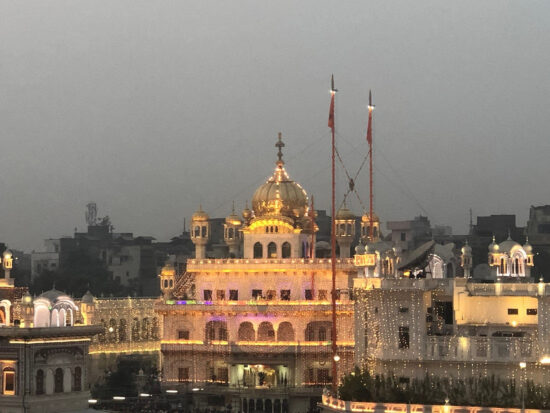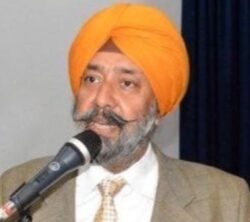 Under the Sikh Gurdwaras Act, 1925, the Shiromani Gurdwara Parbandhak Committee (SGPC) General House elects its President and Executive Committee on a year-to-year basis, traditionally in late autumn. On paper, this annual ritual signals vitality: an elected House choosing its leaders, debating management, and renewing accountability. In practice, however, the ritual conceals a deeper malaise. The last general election to constitute a fresh General House was held back in 2011. Since then, the same House has been re-electing the Executive each year. We have, in effect, institutionalised a democracy of incumbents.
Under the Sikh Gurdwaras Act, 1925, the Shiromani Gurdwara Parbandhak Committee (SGPC) General House elects its President and Executive Committee on a year-to-year basis, traditionally in late autumn. On paper, this annual ritual signals vitality: an elected House choosing its leaders, debating management, and renewing accountability. In practice, however, the ritual conceals a deeper malaise. The last general election to constitute a fresh General House was held back in 2011. Since then, the same House has been re-electing the Executive each year. We have, in effect, institutionalised a democracy of incumbents.
This is not a procedural quibble. It goes to the core of Sikh institutional legitimacy. The SGPC is often described, not without reason, as a “mini-parliament” of the Sikhs. Yet a parliament loses its moral authority when its electorate is frozen in amber. A generation of Sikhs who have come of age since 2011—men and women who have turned twenty-one and earned the franchise—have never once voted for the body entrusted with the stewardship of our historic gurdwaras. Annual executive polls of an unrefreshed House are a substitute for democracy, not its expression.
When Continuity Becomes Capture
It is unsurprising that political continuity has hardened into political capture. The Shiromani Akali Dal (Badal) continues to exercise a vice-like grip over the House’s composition and, consequently, the SGPC’s top office. Announcements of “wide consultation” preceding the re-nomination of the same leadership, lead by Advocate Harjinder Singh Dhami as the President, fool nobody. When the electorate remains unchanged for fourteen years, re-churning yields the same butter. The result is a revolving door of loyalists, not a marketplace of ideas.
I hold no brief for the faction of the Shiromani Akali Dal led by Giani Harpreet Singh. Yet, if its members are genuinely committed to institutional reform and transparency, they would do well to tender their resignations as members of the present SGPC. Such an act would make it clear that they do not wish to lend even passive legitimacy to a General House that has lost not only its democratic authority but also the moral confidence of the sangat. A principled disengagement now could send a powerful signal that renewal, not accommodation, is the only honourable path forward.
The practical consequences are visible. The SGPC’s leadership has repeatedly been accused of using transfers, appointments and removals of jathedars as instruments of convenience rather than solemn responsibilities. Whether these accusations are fully fair or not, the perception persists because the electoral foundation is brittle. When authority flows from a stale mandate, every exercise of that authority appears suspect. A living mandate, renewed through genuine polls, is the best disinfectant.
Haryana Is Not a Redo Button
Some have sought to muddy the waters by suggesting that Sikhs in Haryana should again be counted within the SGPC electorate, reopening an argument that law and logic have already settled. Haryana has its own statutory committee and has held its own elections. To now demand that the same voters be represented in two parallel institutions is to invite duplication, confusion and avoidable conflict. Double representation is not inclusivity; it is institutional disorder.

This is not to deny the genuine anxieties that Sikhs in Haryana have expressed about heritage, resources and voice. Those concerns must be addressed within the framework of their state committee and through cooperative arrangements between institutions. But the attempt to use the Haryana question as a lever to further delay SGPC polls—or to skew their outcome—must be resisted. The Sikh panth deserves clarity, not a perpetually moving goalpost.
The Centre’s Responsibility: Appoint, Notify, Conduct
If the SGPC’s leadership has benefited from inertia, the Union government’s stewardship of the process has been lacklustre. The Chief Commissioner, Gurdwara Elections is not a ceremonial post. It is the fulcrum on which the entire electoral process rests—rolls, schedules, supervision, redress. After the last incumbent, former Chief Justice, S.S. Saron, demitted office, the failure to promptly appoint a successor and to issue clear, time-bound notifications has left the field open to rumour, litigation and drift. When the umpire vanishes, the game descends into argument.
This is not a call for the Centre to insert itself into SGPC affairs. It is a demand that the Centre discharge its precise, narrow statutory duty: to create the conditions for free and fair elections and then get out of the way. Appoint the commissioner; publish the calendar; ensure the machinery is in order; and let the voters decide. Procedural opacity does not protect the sanctity of religious institutions; it corrodes it.
The Democratic Cost of Delay
Every year without a general election carries a cost paid by ordinary Sikhs. It deprives first-time voters of the formative experience of shaping the panth’s institutional course. It dampens the incentive for new leaders—youth, women, professionals, scholars—to step forward with programmes of reform. It induces complacency among incumbents and cynicism among the faithful. Above all, it distances the SGPC from the sangat, converting responsive stewardship into remote management.
Consider the span since 2011: new challenges in heritage conservation, digital archiving, religious education, diaspora engagement, and financial transparency have emerged with force. The Sikh world has changed; the issues are more complex; the opportunities are greater. Yet the representative base of the SGPC has remained static. Institutions that aspire to guide a living tradition cannot operate on a mandate from a vanished time.
What Fresh Elections Would Achieve
Fresh elections are not a magic wand. They will not banish factionalism, end litigation or instantly produce saintly administrators. But they will do three indispensable things.
First, they will restore legitimacy. A House chosen by current voters commands compliance without coercion. Decisions—even controversial ones—gain a presumption of fairness when they emanate from a recently refreshed mandate.
Second, they will broaden participation. New voters bring new expectations: about transparency in finances; about merit-based appointments; about modern management of historic gurdwaras; about respectful engagement with the diaspora; and about insulation from narrow partisan agendas. A larger, younger electorate will not tolerate procedural opacity or transactional governance.
Third, they will discipline incumbents. The prospect of imminent electoral judgment focuses minds, elevates debate and punishes complacency. Candidates cannot run on nostalgia alone; they must present programmes that speak to today’s sangat.
The Roadmap: Simple, Lawful, Immediate
The remedy is straightforward and entirely within the four corners of the law. The Union government must, without further prevarication, appoint and publicly notify the Chief Commissioner, Gurdwara Elections. The Commissioner must be empowered to publish updated electoral rolls for Punjab, Himachal Pradesh and Chandigarh, reflecting current eligibility and excluding jurisdictions that have their own statutory arrangements. A clear election schedule should follow, providing adequate time for nominations, scrutiny and campaigning, but not so much as to invite further mischief.
Simultaneously, rules and practices should be modernised in spirit if not in statute. Transparent publication of rolls, digitisation of processes, time-bound grievance redressal, and publicly accessible polling station information will improve confidence. Parties and panels should be encouraged—by moral suasion if nothing else—to select candidates who reflect the breadth of Sikh society: women, youth, members of Scheduled Castes and the far-flung diaspora who bring skills and perspectives the SGPC urgently needs.
A Call to the Sikh Youth
The loudest voice in this moment should be that of Sikh youth—respectful, resolute and organised. This is not a call to agitate for agitation’s sake. It is a call to insist on the most basic right in any representative system: the right to vote. Young Sikhs must form study circles, hold town-hall meetings, engage their elders, and press every responsible authority to complete the electoral process. Their message should be simple: let us vote, and we will accept the verdict.
The panth’s history is one of reform through sacrifice, of institutions forged in the crucible of principle. The gurdwara reform movement of the 1920s was not a bid for permanent revolution; it was a bid for permanent accountability. We honour that legacy not by invoking it as rhetoric but by living it as practice. A living practice demands timely elections.
The Cost of Further Delay
Anything less than immediate steps towards a general election will deepen a crisis of legitimacy that no number of annual executive ballots can mask. It will keep an outdated House in charge of timeless shrines. It will confirm the suspicion that power, once acquired, is to be hoarded rather than renewed. And it will do a grave injustice—not only to Sikhs in Punjab, Himachal Pradesh and Chandigarh, but to the wider Sikh world that looks to the SGPC for example and leadership.
The cure is known, lawful and overdue. Appoint the commissioner. Notify the schedule. Update the rolls. Hold the election. Let the sangat speak. And then let every office-bearer, jathedar and committee member act with the humility that only a fresh mandate can confer.